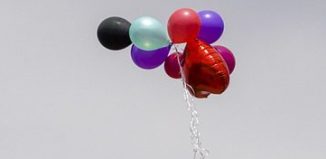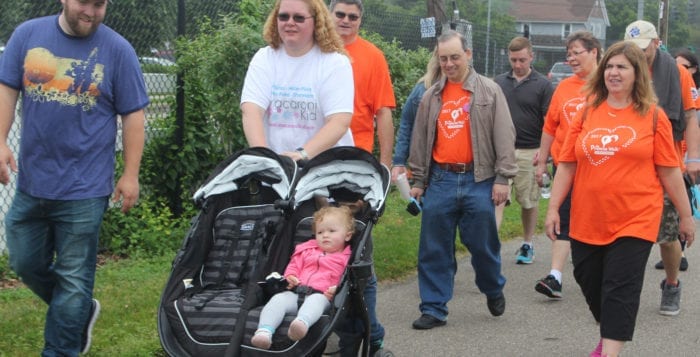
By Kevin Redding
Families and friends walked to raise awareness and funds to help put an end to a life-threatening pregnancy disorder.
Coram mom Jen DiSanza was 33 weeks pregnant with her second child in early 2016 when she started experiencing what felt like really bad heartburn, which she was told was a common symptom experienced at the end of pregnancy.
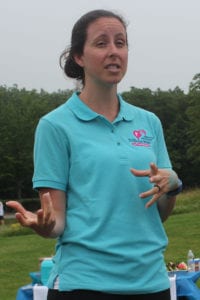
Even though a recent visit to the doctor had ensured her everything was going well, in a matter of days, she was vomiting, her blood pressure was up to 188/110 and her liver was shutting down while in labor seven weeks ahead of schedule at Stony Brook University Hospital.
“My liver enzymes were very high, my blood stopped clotting and my platelet count dropped — normal is around 200,000 and I was at 27,000,” DiSanza said. “I couldn’t even walk down the hallway in the hospital because if I stubbed my toe, I could internally bleed to death.”
She was soon diagnosed with HELLP syndrome, which is a complication of preeclampsia, an all-too-prevalent but widely overlooked pregnancy disorder that threatens the lives of mothers and their unborn babies. HEELP gets the acronym for hemolysis, elevated liver enzymes, low platelet count, which are all affected by the disorder.
There is currently no direct cause, which affects .2 to .6 percent of all pregnancies, which symptoms include headaches to swelling, according to the American Pregnancy Association. Women in the United States are at a higher risk for maternal death than women in 47 other countries, and about 4 to 12 percent of women diagnosed with preeclampsia develop HELLP syndrome.
Since giving birth to her perfectly healthy daughter, Elisandra, at midnight Feb. 4, 2016, DiSanza has bounced back from a post-birth health crisis and become an active volunteer with the nationwide Preeclampsia Foundation, an empowered community of patients and experts that aims to raise public awareness of the disorder and funds for research and a cure.
The foundation is a driving force behind two bipartisan bills currently trying to be passed in Congress that would support states in their efforts to identify a cause for the disorder and use their findings to improve healthcare quality and ultimately inform change.
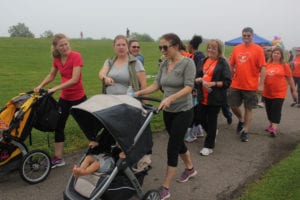
DiSanza, with the support of several sponsors including Macaroni Kid and Eurofins NTD, organized the Promise Walk for Preeclampsia June 17, where dozens of local residents affected by the disorder in some way or another walked a mile and half around Heritage Park in Mount Sinai in support of disorder recognition and research.
A goal for donations to the foundation was set at $5,000, $3,000 of which was raised before the event even started. Gift certificates to local businesses were raffled off and a post-walk workout session was offered by Energy Fitness of Miller Place, where DiSanza works as an instructor. Face painting was available for kids.
“A lot of people aren’t aware of what preeclampsia actually is, and how serious it can be and how quickly it comes up,” DiSanza said to the small crowd before the walk began. “There’s a lot that women just don’t know to look for. Being here, and telling all your friends and family why we’re here, helps to share that message. [The foundation] sends out pamphlets to doctors’ offices and clinics around the country, they explain the warning signs and what to look for.”
Laura Moakley, a Seaford resident who helped DiSanza coordinate the event, and her 6-year-old daughter, Rowan, wore a pink shirt that read “Kick Preeclampsia to the Curb.” Moakley was diagnosed while 32 weeks pregnant with Rowan in 2011 after her midwife mistreated the signs.
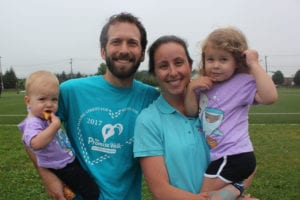
Feeling scared and uncertain of what awaited her, having been told she or her child could die in labor, Moakley had an emergency Cesarean section and woke up with a photo of Rowan next to her pillow. Her daughter spent 35 days in the Neonatal Intensive Care Unit.
“I felt robbed of a normal pregnancy … why didn’t I have the picture perfect pregnancy that our society needs to see? My goal was for no other woman to ever have to go through this,” Moakley said as a happy and healthy Rowan hugged her. “Awareness is key — we must continue forward with all of our work, our walks, changes in the medical community and even Congress.”
She eventually discovered the foundation online and found a network of women and men to talk to and get support from.
“I feel more connected … I feel like we’re not alone,” she said. “I feel like there’s a movement happening and there could be change in the future. I already see there’s more awareness and support … not just for women, but men, who are just as deeply affected by it also. There’s the stress of coming home without a baby or of having to take care of a premature baby.”
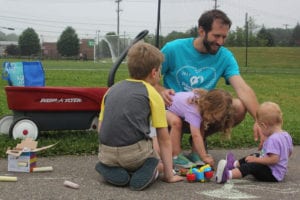
DiSanza’s husband, Ray, could vouch for that stress.
“It was the single most horrifying experience of my life,” he recalled. “I didn’t know all that much about preeclampsia before it happened … it was a good thing that Jen did, because if we had both been as ignorant of it as I was, we might not be here today.”
Dr. Terrence Hallahan, of Eurofins Clinical Diagnostics in Melville, spoke of a recently developed test screening for early onset preeclampsia at the lab, which is the only one offering the test at the moment.
“It’s something near and dear to our hearts,” Hallahan said. “We now have the ability to test pregnant women in the first trimester, and determine which are most likely to develop early onset preeclampsia. Not only can we detect this, we can now prevent it. People need to know.”


